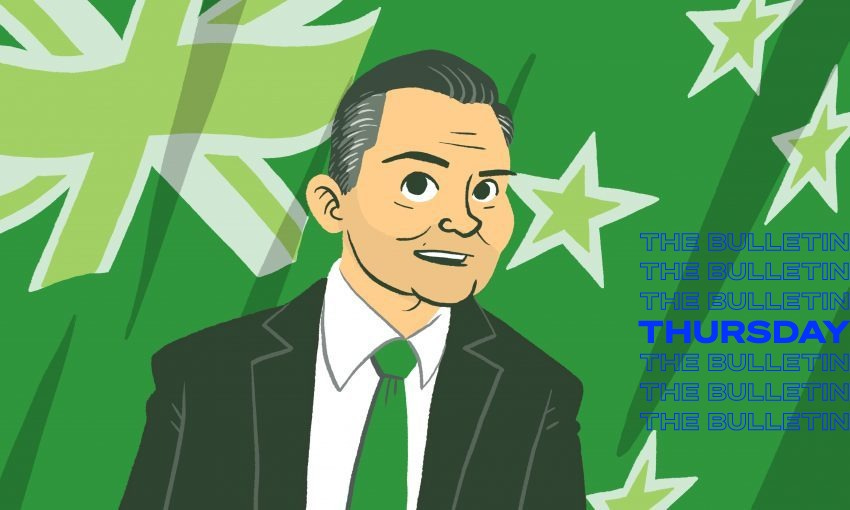James Shaw on the road to Glasgow
The climate change minister says for all his irritations at the pace of change in government, momentum is growing to finally start emission cuts
Mōrena and welcome to The Bulletin for Thursday, September 23, by Justin Giovannetti. Presented in partnership with Z Energy.
In today’s edition: The end of zero cases, new tactical police officers, a 10 year plan for mental health, but first, the country’s goals at the Glasgow climate summit.
Climate change minister James Shaw warns looming climate talks won’t be easy. (Toby Morris)
The road to COP26. James Shaw is booked to fly to Glasgow at the end of next month for a United Nations climate conference where the world is poised to recommit to ambitious plans to stop the growth of greenhouse gases this decade. While New Zealand won’t have an emissions reductions plan ready, the climate change minister told The Bulletin that he’ll have a bolder target to reduce emissions than the one committed to in Paris in 2015 and a rough outline of how the country will make it happen.
New Zealand’s independent Climate Change Commission reported back earlier this year that the country’s emissions reductions target in the Paris Agreement isn’t consistent with its pledge to keep warming at 1.5°C above pre-industrial levels. “We’re intending to increase ours, but we haven’t made the decision about what we will increase it to,” Shaw told me last night. Cabinet should approve a new figure within the next few weeks.
A quick primer on the Glasgow climate summit. Countries are being asked to show up in Scotland with ambitious emissions reductions targets for 2030 and plans to get to net zero emissions by 2050. Six years ago, most countries agreed to this in the Paris Agreement. Glasgow is where the plans start to firm up. One of the key goals of the summit is to turn lofty but ambitious statements from Paris into real goals. According to Shaw, there’s been a “war” behind the scenes since 2015 on getting to something firm, which balances short-term economic interests with, well, the long-term survival of humanity.
There’s frustration as Shaw describes New Zealand’s progress. Frankly, nothing will be easy in Glasgow, he said. “It is an incredible uphill battle.” The country will have a comparatively small team there, made up of Shaw and 14 diplomats and support staff. There will be multiple meetings running at once, so New Zealand won’t be at the table for all of them. “We know that we’ll be losing in a number of forums, but you need to focus on your highest priorities,” he said. The reality is that New Zealand’s climate record hasn’t been great. The clean, green image won’t cut it at a conference where everyone has the latest statistics on hand.
“This is the price of the inaction of successive governments over the last 30 years. If you track back to the late 1980s and early 1990s, there was a window of opportunity where we could have arrested emissions growth to 1990s levels. In fact, our very first climate change target, which was set in 1990, was a 20% reduction from 1990 levels by the year 2000. Instead, over the course of the last 30 years our emissions are up dramatically on that,” said the Green co-leader.
“Instead of having this very gentle, gradual decline in emissions over a long time period, we now face a very steep reduction in quite a short period of time. The economic consequences of that are hard to manage,” he said.
Is the foot dragging all in the past? A transport budget last month shovelled cash into new roads and highways. Electricity generation is relying on more coal than it has in decades and the government hasn’t come forward with any green new deal. Even his own emissions reduction plan is now delayed for five months, requiring a rewrite of the law—“I’m not delighted by that,” he said.
The headlines, I point out to Shaw, aren’t indicating an end to inaction.“Yeah, I have quite a lot of frustration at the pace of change and how long it takes for government to do anything,” he said.
“To use the perhaps appropriate metaphor of the oil tanker turning, it takes a long time to turn, but once it turns it brings that momentum with it. My sense of it now is that momentum is really starting to build. Our first term of government was very much around the legislative framework and that was a bloody devil to get through. This term is to make it happen in reality,” Shaw added.
The case for optimism. We’re at a moment where momentum is building and private industry is really pushing ahead, said Shaw. The frustration he sometimes feels is matched by that optimism. Within the next few years, emissions will need to start falling rapidly and the economy will keep on growing. That’s already happened in the UK. Once that happens here, the transition could happen faster and cheaper than most people expect.
If you like what you’re reading, we need your support. The Spinoff is doing our utmost to keep you updated on Covid-19 related news. Every dollar our members contribute directly funds our editorial team and is devoted to ensuring we do more. Click here to learn how you can support the team today.
August might have been the end of no Covid in New Zealand. “We may not get back to zero,” Ashley Bloomfield warned yesterday, according to RNZ. The country can stay the course with the elimination strategy, but new cases could continue to appear in the community going forward. Modelling has shown that delta might have spread too far to get back to zero, as contact tracers will struggle to remain ahead of it. With confusion around the meaning of elimination, Siouxsie Wiles wrote in The Spinoff that the country needs to stick with a strategy based on getting back to zero or near zero in New Zealand.
What is elimination according to the government? “Elimination is zero tolerance for cases when they pop up,” Covid-19 minister Chris Hipkins said yesterday.
The Covid numbers: 23 new community cases were reported yesterday in Auckland and 50% (7) of the previous day’s total were in the community while infectious. There are now 273 active cases. 53,721 people were vaccinated on Tuesday.
The Spinoff’s Covid data tracker has the latest figures.
A difficult day in Melbourne after one of the strongest earthquakes recorded in Australia. Authorities in Victoria have warned of possible aftershocks in the coming weeks and months after the state was hit by the largest earthquake in its history, ABC reports. The magnitude 5.9 earthquake was also one of the strongest in eastern Australia since Europeans arrived. Hours later, riot police shot rubber bullets at anti-vaccination protestors in the third day of violent clashes in Melbourne.
With police warning that right-wing “professional protestors” have infiltrated what began as a protest by construction workers, The Conversation details how anti-vaxxers, conspiracy theorists and the far-right came together to create a hi-vis mob.
A new class of tactical police officers are being added to target drugs, gangs and guns. The police commissioner has insisted that the tactical response officers won't be armed in their day-to-day duties like the armed response teams cancelled last year, according to Stuff. The officers will focus on high-risk offenders, guns and organised crime. They'll have more training and will be able to support constables in high-risk situations. All without guns. Newshub reports that National’s police spokesperson Simeon Brown said the new tactical officers were just the ill-fated armed teams being reintroduced in “disguise”.
A decade-long effort to lift New Zealand’s mental health. Kia Manawanui is the government's new 10-year plan to deal with the causes of mental distress in the population, RNZ reports. According to health minister Andrew Little, it’s a new approach to help promote mental wellbeing. The National party's mental health spokesperson Matt Doocey said that what the country doesn’t need is another long-term strategy, but a plan for today.
Cricket is dropping the term batsman to reflect a more inclusive game. Stuff reports that the gender-neutral term “batter” will now be used after a decision by the Marylebone Cricket Club, the London-based group that pretty much sets down the laws of cricket. In a way, it reflects choices already made by other clubs as the women’s game has taken off in recent years.
Got some feedback about The Bulletin, or anything in the news?
Get in touch with me at thebulletin@thespinoff.co.nz
(Archi Banal)
Right now on The Spinoff: Dylan Reeve reports on new data showing hundreds of New Zealanders have been victims of recent cyber attacks, in the latest instalment of IRL. Rosie Collins explains that out of control housing prices are having a ripple effect across the country’s social and economic fabric. Tara Ward writes about the latest shocks on Celebrity Treasure Island with a look at who is up and who is down. Justin Latif heads down to Manurewa where a converted Auckland Airport bus has become the shot bus and it’s a hit. Madeleine Chapman headed out in her slippers at midnight to chronicle the return of takeaway in Auckland.
Team New Zealand says a last-gasp attempt to keep the America's Cup in Auckland is over. The team said that a private group trying to keep the cup here was “underhanded and deceitful” in a public statement that marked the end of a growing rift, RNZ reports. The past week has seen allegations of backroom dealings and attempted court action, with both sides fighting it out in public. What had been a hopeful attempt for Auckland has ended in an extraordinary breakdown between a business-led group raising $80 million and Team NZ claiming that the group was actually working with Americans to tie-up the cup defence in legal action.
That's it for The Bulletin. If you want to support the work we do at The Spinoff, please check out our membership programme.







